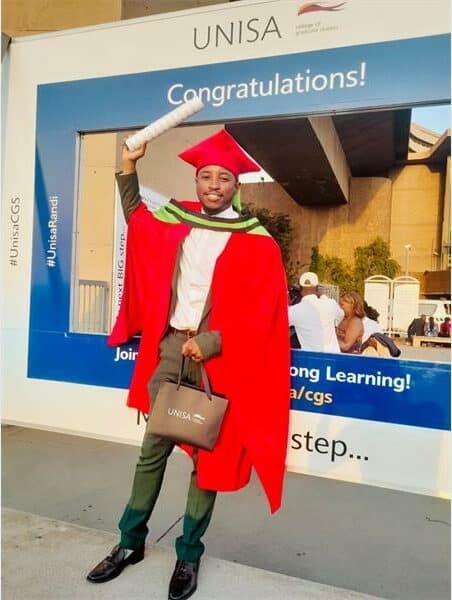Dr Reverend Lindokuhle Bafana Manuel (Maphosa) hails from the township of Kwa-Thema.
What motivated you to study for a Doctor of Philosophy degree (PhD) in accounting sciences?
It is my passion for teaching in higher education and research. My area of expertise lies in public sector accounting, financial governance and internal auditing, specifically in higher education. Hence, the discipline of the qualification is accounting sciences.
While I was still studying towards my undergraduate qualification, I was involved in tutoring students at the Tshwane University of Technology (TUT).
Upon completion of my junior degree, I was approached by the late Professor Robert Rugimbana, the former executive dean of TUT’s Faculty of Economics and Finance, and Sindi Xavier Makgopha from the Department of Public Sector Finance at TUT to initiate my career as a part-time lecturer in the Department of Public Sector Finance.
My career goal over the past decade in academia has always been to keep advancing as an academic, expanding my scholarly activities by enriching students academically through teaching, learning, community engagement and research supervision.

Also, as a senior certified government accountant and researcher from SA, my research objective has always been to enhance and reinforce the research output in the field of public sector accounting and financial governance since the research output is currently very low in this sector compared to other disciplines.
Unarguably, the foregoing has motivated me to obtain the highest degree on land – a doctoral degree at NQF level 10 – which enables me to make meaningful original contributions to the knowledge of accounting sciences, particularly in the area of public sector accounting and financial governance.
What is the course based on?
Unlike a masters qualification, where students must demonstrate the ability to work independently and reflect critically on theory and its application, the Higher Education Qualifications Sub-Framework (HEQSF) stipulates that a doctoral qualification (course) is all about demonstrating high-level research capability and making a significant and original academic contribution at the frontiers of a discipline or field, in my case, accounting sciences.
How long did it take to get where you are?
It varies with different higher education institutions. I completed my PhD qualification at the University of South Africa, where a doctoral programme runs for a maximum of six years.
My supervisor, Professor Lourens Erasmus, once said, “If it were easy, everyone would be pursuing a doctoral degree”. With that said, the journey was arduous, meaning it was difficult, tiring and involved a lot of effort.
ALSO READ: Young chef inspired to bring families together through food
What challenges did you face along the way?
Among other challenges encountered was the collection of data from my targeted research participants. My research study was based on category C municipalities (district municipalities). Thus, requesting the research participants from all district municipalities in SA to participate in the study and collecting data was not an easy task.
What advantages came your way? What did you most gain?
Among the advantages were the developed skills. I developed unique technical and soft skills throughout the PhD programme. The other advantage was networking opportunities.
Throughout the PhD programme, I expanded my network and met diverse people with similar interests. Contribution to society was also advantageous because it provided a deep and comprehensive understanding of my discipline – accounting sciences.
The most important achievement of being a PhD holder was the prestige of adding the Dr title in front of my name.
Among the obstacles I can remember was balancing work and personal life. Since a doctoral degree requires massive commitment, I found it challenging to balance my studies. As a result, I had to reduce activities in my social space to focus on my studies.

Did you face any emotional or physical challenges?
Absolutely, I encountered mental and emotional strain. The stress and pressure of creating new research, navigating academia and balancing my personal and professional life was stressful and overwhelming.
What are your aspirations as a doctor in your studies?
Among my aspirations is the willingness to improve my career prospects, teaching, and becoming a competent researcher who can conduct independent research in my chosen area of expertise.
What are you most grateful for?
Being overwhelmed by the demands of the PhD programme and the pressure of completion, I navigated the PhD journey with a sense of calm and balance by following key strategies to manage stress and stay focused.
What was your support system like at home or around you?
The PhD experience has proven to be challenging and profoundly satisfying, filled with crucial learning opportunities, personal evolution, tenacity and many nights of lost sleep.
Attaining this significant achievement is a source of great pride for me. It illustrates the unwavering support I have had from my family, especially my wife, Lesego Manuel, friends, colleagues and fellow community members throughout this journey.
ALSO READ: Embrace the twists and turns of your learning journey: Focus on electrical engineering
At Caxton, we employ humans to generate daily fresh news, not AI intervention. Happy reading!

